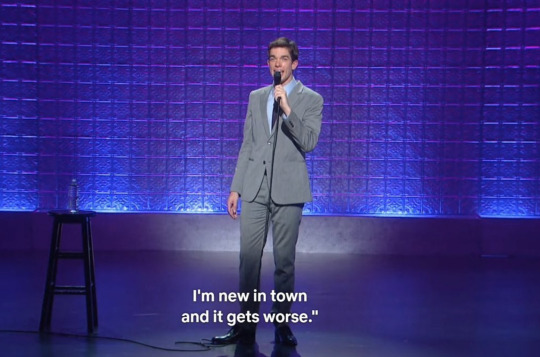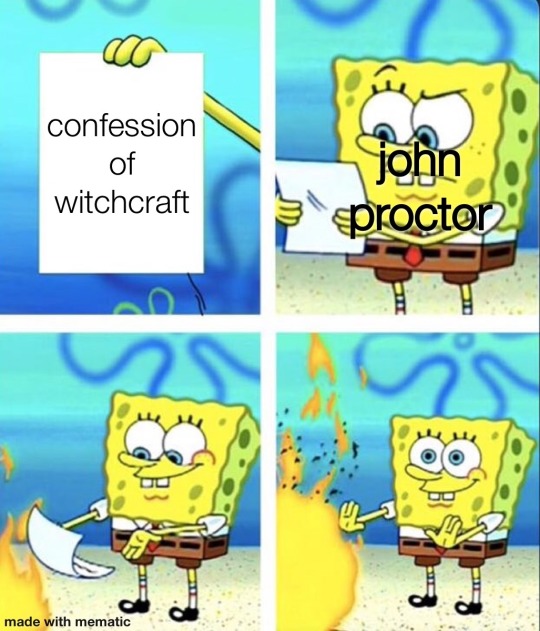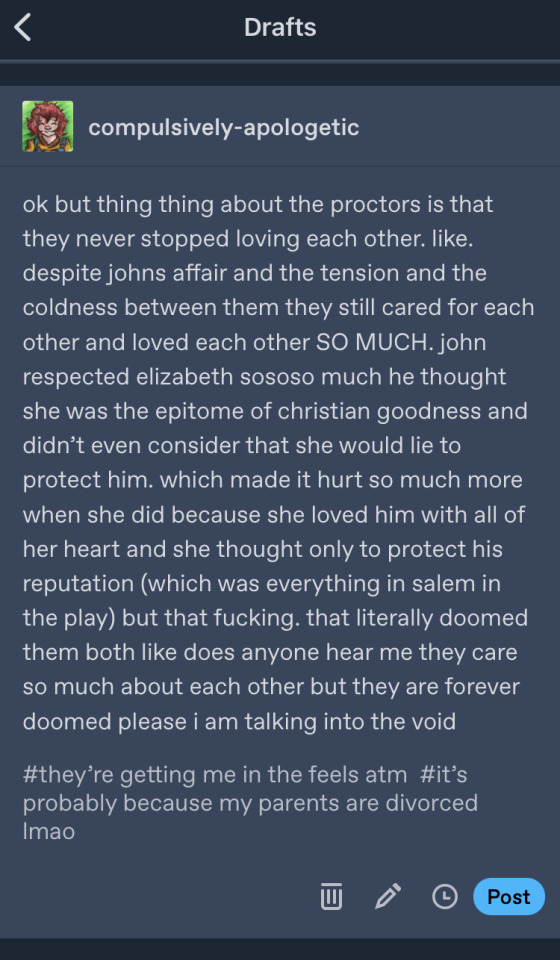Text
the salem witch trials were the original callout posts
4 notes
·
View notes
Text
Why John Proctor is not the villain (sponsored by Kimberly Belflower, English Teacher KP, and your local Enneagram 1):
Yes, you read that correctly. I don't appreciate readings like this, even though I understand the place from which they come, because they miss the point of his arc and the play as a whole.
Now, John absolutely hurt many people, and that was inexcusable. I am not in the camp of audience members who sympathize with him without question and downplay his actions. In fact, if you read my staging posts, you'll see that some of my decisions for a production would actually make it harder to give him your sympathy. However, that is not the point of this post; the point of this post is to argue that he is not the villain.
Readings like this tend to come from a place of reaction to the audience members who sympathize with John unquestioningly, often villainizing Abigail in the process. On some level, I understand the urge to react in such a manner when Abigail's storyline reflects the harsh reality of many people in real life. Being asked to sympathize with John sits uncomfortably with them, and that makes perfect sense. You absolutely should feel uncomfortable with how he betrayed his wife and took advantage of a developing, isolated girl in the process.
What, then, makes it so that he is not the villain? Simply put, it's his arc that counteracts this. John is troubled, believes himself to be the villain, and plays into this repeatedly by continuing to hurt people. At the same time, he desires justice for the people close to him, and this desire for truth to prevail is what prompts him to confess his affair in spite of his conflicting desire to keep his reputation intact. This is a brave thing to do, not only in and of itself, but also as something he now has to prove to himself that he is not fully lost when he has it in him to tell the truth. We see this happen again when he refuses to falsely confess an allegiance with the devil, an effective refusal to live the lie that he is beyond saving.
"So what?" you're probably thinking. "Being sorry doesn't erase what he did and I don't see why he should be forgiven."
Maybe you don't think John should be forgiven, but he absolutely needs to be forgiven because he's not innocent. Does that forgiveness have to come from the people around him? Now, it's not their obligation, but he needs to at least forgive himself. John's arc is about finding the maturity and bravery to acknowledge his wrongs without letting them be defining--about recognizing that true justice and fairness allow oneself and others to possess this kind of nuance. Those aren't traits that a villain would have (and are in fact traits in which the greater-scope antagonist Danforth is lacking). Miller uses this to impart to his audience that a person's failings should not be defining and that we need to grant grace to ourselves and others instead of being so quick to judge and ruin. Thus, as much as John is his own worst enemy, he is not the villain, and it disservices everyone to read him as such.
9 notes
·
View notes
Text
Reverend Hale

175 notes
·
View notes
Text
also happy ides of march to those who celebrate
1 note
·
View note
Text
oh yeah. i know i’m personally kinda inactive on this blog but it’s still mine so i can post what i want. i also don’t care if this blog is “nonpolitical” or whatever (because at its core that’s simply not true)
that being said: free palestine. today, tomorrow, forever. fuck the occupation and good riddance to any zios who follow this blog. get out. HOWEVER. i will also NOT tolerate antisemitism either. get your nasty bs out of my house. do i make myself clear?
also: free congo. free sudan. free yemen. free every oppressed and downtrodden and marginalized people in the world. free the world from western imperialism. we’re not free until we’re all free.
glory to the martyrs and the revolution.
- mod dio
(if you really want to “debate” with me or talk to me about this [and i may not answer depending on you and your approach] dm my main, genderqueer-karma. thanks. or not. i don’t care much.)
#not a meme#mod dio#and don’t discourse in the notes. i don’t care#i will simply block you#the block button and i are brothers in arms#and also don’t bring shit into the ask box. i don’t give a fuck.#ESPECIALLY if you’re going to do it on anon. don’t be a coward.
0 notes
Text







english class inspired me greatly, my classmates love my memes :)
64 notes
·
View notes
Text

Guess who's reading The Crucible in English class
41 notes
·
View notes
Text

19K notes
·
View notes
Text
@boygirltwins blessed me with this and I am blessing all of you with it, too.
2 notes
·
View notes
Text
In honor of my completion of DWTC annotations, I present to you my resurfaced thoughts on how the Proctors' attachment styles create their dynamic because it's become my Default Thought (TM) again and I will never in fact get over this.
So there's Elizabeth and she's fearful-avoidant, and there's John and he's anxiously-attached. (Note that it is a documented phenomenon to have the anxiously-attached subconsciously seek avoidant partners who aren't quite that available.) They both experience some level of anxiety about the relationship, but he personalizes her avoidant tendencies and believes they're about him specifically. They're not--she's just afraid he'll realize she's more broken and less lovable than he thinks.* This personalization of her avoidant tendencies, combined with their mutual inability to discuss their anxieties (on her end, obviously out of the aforementioned avoidance, and on his end, out of gender roles where he, as a man, cannot openly express his anxious attachment), ultimately leads to their downfall. Both are willing to burn their candles at both ends for each other regardless of personal cost, but neither is able to communicate and his tolerance for the frustration and distress of it all turns out to be lower.**
*Would this be an Ellie post if I didn't discuss how their disorders play into this? Of course not, so I am now going to discuss how their disorders play into this! I've mentioned before the idea of John's splitting in relation to Elizabeth as his designated "favorite person" and that he swings from idealization to disappointment when their communication fails. What I have not mentioned before is that both approaches make her feel even more unworthy. "Why does he think of me as so wonderful? He's going to realize soon that I'm not as lovable as he thinks," then, "So he's finally realized I'm not as lovable as he thinks. I knew he would, but why did it have to be just when I thought I was safe?" See also the chorus of "all my daughters" by dodie. It fits so perfectly. (The flipside of this is of course that when he turns his splitting on himself following his affair, he expects her to be thinking of him the same way, even though she's not--she's hurt, but not to the point of viewing him as solely bad. "I never thought you anything but a good man, John, only bewildered somewhat," anyone?) On the other end, I've mentioned before what the idea of reading Elizabeth as on the spectrum implies for her character: alexithymia makes cognitive empathy harder, so she knows something is wrong but can't quite put words to it that easily. She's also more prone to the ignition of rejection sensitive dysphoria, so...let's just say for a third time that her husband's splitting doesn't help, as well as that the time period's inability to understand her symptoms as anything other than deliberate resistance is also a factor. (Oh, and by the way, this absolutely includes her own inability to understand her symptoms as anything other than deliberate resistance! She feels inherently broken and yet finds herself seemingly unfixable.) I've said before that perhaps her low self-esteem comes from this misunderstanding and the resulting mistreatment, which gave her the fearful-avoidant attachment that she carries with her into her marriage.
**This is not necessarily a bad thing--the bad thing is what it led him to. I would argue that Elizabeth's ability to tolerate that much is a bad thing because she's put up with so much that she cannot believe she is worth asking for more.
3 notes
·
View notes
Photo

57 notes
·
View notes
Photo

65 notes
·
View notes
Text

i was so right for this btw
81 notes
·
View notes
Text
Elizabeth: You get 100 oranges, but if you accept, the person you hate most also gets 100 oranges. Do you still accept?
Proctor, without a moment's hesitation: Of course. Why wouldn't I want 200 oranges?
Elizabeth, sighing and shaking her head: John, we've talked about this--
(I recognize that it has been a long time since I've posted incorrect quotes, but hi. Also, this could go both ways.)
#mod ellie#arthur miller#the crucible#classic lit#classic literature#classic lit memes#ellie's incorrect quotes
27 notes
·
View notes
Text
I'd like to thank Reverend Hale for being the only person in Salem making frequent use of the Town Brain Cell.
159 notes
·
View notes
Text
John Proctor: why are you making up these accusations?
Abigail Williams:

257 notes
·
View notes
Text
Why John Proctor is not the villain (sponsored by Kimberly Belflower, English Teacher KP, and your local Enneagram 1):
Yes, you read that correctly. I don't appreciate readings like this, even though I understand the place from which they come, because they miss the point of his arc and the play as a whole.
Now, John absolutely hurt many people, and that was inexcusable. I am not in the camp of audience members who sympathize with him without question and downplay his actions. In fact, if you read my staging posts, you'll see that some of my decisions for a production would actually make it harder to give him your sympathy. However, that is not the point of this post; the point of this post is to argue that he is not the villain.
Readings like this tend to come from a place of reaction to the audience members who sympathize with John unquestioningly, often villainizing Abigail in the process. On some level, I understand the urge to react in such a manner when Abigail's storyline reflects the harsh reality of many people in real life. Being asked to sympathize with John sits uncomfortably with them, and that makes perfect sense. You absolutely should feel uncomfortable with how he betrayed his wife and took advantage of a developing, isolated girl in the process.
What, then, makes it so that he is not the villain? Simply put, it's his arc that counteracts this. John is troubled, believes himself to be the villain, and plays into this repeatedly by continuing to hurt people. At the same time, he desires justice for the people close to him, and this desire for truth to prevail is what prompts him to confess his affair in spite of his conflicting desire to keep his reputation intact. This is a brave thing to do, not only in and of itself, but also as something he now has to prove to himself that he is not fully lost when he has it in him to tell the truth. We see this happen again when he refuses to falsely confess an allegiance with the devil, an effective refusal to live the lie that he is beyond saving.
"So what?" you're probably thinking. "Being sorry doesn't erase what he did and I don't see why he should be forgiven."
Maybe you don't think John should be forgiven, but he absolutely needs to be forgiven because he's not innocent. Does that forgiveness have to come from the people around him? Now, it's not their obligation, but he needs to at least forgive himself. John's arc is about finding the maturity and bravery to acknowledge his wrongs without letting them be defining--about recognizing that true justice and fairness allow oneself and others to possess this kind of nuance. Those aren't traits that a villain would have (and are in fact traits in which the greater-scope antagonist Danforth is lacking). Miller uses this to impart to his audience that a person's failings should not be defining and that we need to grant grace to ourselves and others instead of being so quick to judge and ruin. Thus, as much as John is his own worst enemy, he is not the villain, and it disservices everyone to read him as such.
9 notes
·
View notes